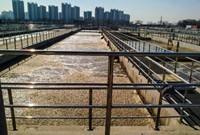Advertisement
Grab your lab coat. Let's get started
Welcome!
Welcome!
Create an account below to get 6 C&EN articles per month, receive newsletters and more - all free.
It seems this is your first time logging in online. Please enter the following information to continue.
As an ACS member you automatically get access to this site. All we need is few more details to create your reading experience.
Not you? Sign in with a different account.
Not you? Sign in with a different account.
ERROR 1
ERROR 1
ERROR 2
ERROR 2
ERROR 2
ERROR 2
ERROR 2
Password and Confirm password must match.
If you have an ACS member number, please enter it here so we can link this account to your membership. (optional)
ERROR 2
ACS values your privacy. By submitting your information, you are gaining access to C&EN and subscribing to our weekly newsletter. We use the information you provide to make your reading experience better, and we will never sell your data to third party members.
Environment
Pig Farms May Contribute to Antibiotic Resistance
Agriculture: Researchers link tetracycline resistance in bacteria with levels of the antibiotic in soil near Chinese pigsties.
by Laura Cassiday
August 20, 2010

As bacteria evolve antibiotic resistance, scientists fear the emergence of super bugs immune to our pharmaceutical arsenal. These resistance genes have spread among bacteria in part through the overuse of antibiotics in people and livestock. Now researchers have demonstrated how routine antibiotic use at Chinese pig farms may have increased levels of tetracycline resistance in soil bacteria from nearby farmlands (Environ. Sci. Technol., DOI 10.1021/es1007802).
"In China and elsewhere, large amounts of antibiotics are used in the animal industry to promote growth," says Yong-Guan Zhu, environmental scientist at the Chinese Academy of Sciences. "If pathogens in the environment are exposed to these antibiotics and develop resistance, this is clearly a health threat to the general public."
When pigs ingest antibiotics such as tetracycline in their feed, they excrete the drug in their manure. Runoff from feedlots then enters the environment and kills susceptible microorganisms, which allows rare bacteria with antibiotic-resistance genes to flourish. The same selection process occurs in the pigs’ digestive tracts. So when nearby farmers fertilize their fields with pig manure, resistant bacteria flushed from the pigs’ guts could transfer resistance genes to the native soil bacteria.
Previous studies have connected tetracycline levels and resistance genes in the environment. But these studies may have underestimated the relationship, Zhu says, by overlooking tetracycline degradation products, which can also kill bacteria.
So he and his colleagues used high-performance liquid chromatography and mass spectrometry to sensitively measure five typical tetracyclines and 10 degradation products in soil samples from farmlands near nine swine feedlots in Beijing, Tianjin, and Jiaxing, China. The researchers also detected 15 different tetracycline-resistance genes in the soil. They then quantified levels of five genes with real-time polymerase chain reaction. Their analysis revealed that the total copy number of the five tetracycline-resistance genes correlated with the total tetracycline concentration, including degradation products, in the soil samples.
The study, which is the first of its kind in China, clearly demonstrates that soils contaminated from animal farms "are major reservoirs of antibiotic-resistance genes in the environment," says Xiangdong Li, environmental engineer at The Hong Kong Polytechnic University. Roger Pickup, a microbial ecologist at Lancaster University in the U.K., agrees and adds that the results should "advise Chinese governmental policy on the use of antibiotics and its consequences."





Join the conversation
Contact the reporter
Submit a Letter to the Editor for publication
Engage with us on Twitter